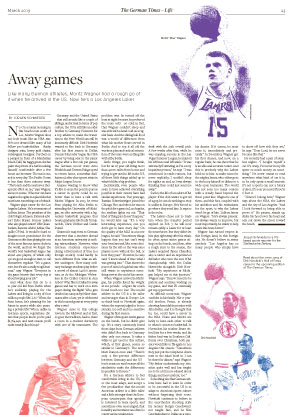Like many German athletes, Moritz Wagner had a rough go of it when he arrived in the US. Now he’s a Los Angeles Laker.
No. On a sunny morning in this beach town south of L.A., Moritz Wagner does not look much like an NBA star. He’s not dressed like many of his fellow pro-basketballers – flashy designer suits, heavy gold chains, extravagant headgear. Perched on a parapet in front of a Manhattan Beach Café, his baggy green clothes paint the picture of a surfer making himself comfortable after a few hours on the water. The sun is out, as it is every day. The Pacific Ocean is less than three minutes away. “The beach and the sea have a therapeutic effect on me,” says Wagner, and so it seems. Whoever can have negative thoughts in a place like this must have something out of whack.
Wagner plays center for the Los Angeles Lakers. He’s a teammate of LeBron James. The president of the club? Magic Johnson. External advisor? Kobe Bryant. Former Lakers who also played center? Wilt Chamberlain, Kareem Abdul-Jabbar, Shaquille O’Neal. It would be hard to imagine more prominence for the German rookie than playing for one of the most famous sports clubs in the world, and lest we forget: the world’s best basketball league has about 400 players, of which only 150 are good enough to start, to call themselves regulars. “It’s a game, sure, but it’s also a really tough business,” says Wagner. “Everyone in the game knows that every day is about keeping your job.”
And what does this do to a 21-year-old kid from Berlin when he’s suddenly playing for the Lakers and living in a city of four million people like L.A.? When, far from home, he’s planning for his future in sports while also pursuing a private life? When, unlike in German sports, regulations dictate that people know you’re paid $1,764,240, and next season you’ll make exactly $2,066,040?
Germany and the United States – that still sounds like a couple of siblings, and at least in terms of pop culture, the US is still like an older brother to Germany. However, for a top athlete to make the transition to the New World can still be immensely difficult. Dirk Nowitzki wanted to flee back to Germany after his first season at Dallas; Dennis Schroeder began his NBA career by being sent to the junior league after a few sub-par games; the German soccer stars Arne Friedrich and Torsten Frings opted to return home, somewhat disillusioned, after short guest stints in Major League Soccer.
Anyone wanting to know what it’s like to cross the pond to pursue a career in sports could do no better than to have a talk with Moritz Wagner. In 2015, he went from playing for Alba Berlin to attending the University of Michigan, an elite university with a legendary basketball program that boasts graduates like Rudy Tomjanovich, Chris Webber and Cazzie Russel.
Granted, it may seem to German observers that a semester abroad at an American university is nothing extraordinary. However, what German students experience during a fixed period of time in a foreign country could hardly be more different from what an athlete undergoes. How many ordinary exchange students play before a crowd of almost 14,000 spectators, as do the Michigan Wolverines in the Crisler Center in Ann Arbor? Who flies to Dallas for away games and has to work on a term paper during the flight? Who gets derided on campus by fellow classmates after a loss, yet is celebrated as the honored guest at every party after a win?
Wagner came to this college town in the Midwest and at first, so goes the tradition, had to share a room in a student dormitory with one of his teammates. The problem was: he turned off the heat at night because he preferred the room cold – so cold, in fact, that Wagner couldn’t sleep and was sick with a head cold on a regular basis. And the dining hall food was a world of difference from what his mother Beate served in Berlin. And to top it all off, the workout plan and tactical orientation of the team were nothing like with Alba Berlin.
Little things, you might think, but for an 18-year-old living more than 4,000 miles from home and trying to get used to life in the US, all these little things added up to what felt like a big problem.
Incidentally, even people who seem to have achieved everything possible in their careers have had similar experiences. Two years ago, Bastian Schweinsteiger joined the Chicago Fire, and when he was on the pitch for a game in Los Angeles, the stadium lights cut out. “That kind of thing just doesn’t happen,” he would later say. “It’s a very interesting experience, one you don’t get to have every day.” On the quality of the MLS as a soccer league, he said: “Sometimes things happen that you just can’t wrap your head around, like some decisions by the refs or the way some players move without the ball, or how they pass.” However, he also said: “I knew ahead of time what I was getting into.” That shows the peace of mind of a global star who still wants to experience something new at the end of his career.
When Wagner arrived in Michigan, his profile listed his weight at 210 pounds – a figure his coach found much too low. The model athlete in the US is a bit taller and stronger than in Europe. Let us think back to Nowitzki again, whom the experts judged to be too slender, too soft and too sensitive during his first season.
Wagner often spent entire games on the bench, but he didn’t give up. It’s a story commonly heard these days from German athletes who didn’t flee back to Germany after only one season. It takes a while to get used to this culture, which, at first glance, seems so similar to Germany’s. The actor Matt Damon once said: “There’s only a five-percent difference between Germany and the US – but it seems so vast because all the similarities make the differences impossible to foresee.”
For a German athlete to feel comfortable living in the US, he or she must adapt, and accept a few peculiarities: that the model American athlete is a little taller and a little stronger than the European counterpart; that egotism is tolerated in team sports, and sometimes even encouraged; that humility and restraint can often be construed as weaknesses.
Those who learn this and know how to use it to their advantage, who don’t give up but press on, can go far in this country. Over the course of his astonishing career, Nowitzki has earned close to $300 million in salary alone from the Dallas Mavericks. Dennis Schröder currently earns $15.5 million a year playing for the Oklahoma City Thunder. The football player Sebastian Vollmer was not even invited to NFL tryouts, but went on to win two Super Bowl rings with the New England Patriots. Wagner pressed on. He became a key starter and led Michigan to the NCAA championship game last spring. And a few months later, the Lakers selected him in the NBA draft with the 25th overall pick. A few weeks after that, while he was enjoying success in the Las Vegas Summer League, he injured his left knee and left ankle. “It was extremely frustrating, as I’m a very impatient person,” he says. “I was mentioned in trade rumors, but never explicitly; I couldn’t sleep for nights on end, as I was always thinking they could just send me away.”
Such is the life of a modern NBA player: if the club wants to get rid of a guy, he can do nothing to stop it, unlike in Europe. He’s forced to go where they send him. It says so in the rules.
The Lakers chose not to trade him when the transfer period expired on Feb. 7; he will now remain safely a Laker for at least the near future. But they didn’t let him play right away after his rehab; he often spent entire games sitting on the bench, and then, after a rough start to the season, the Lakers acquired Tyson Chandler, also a center and an experienced defender who won the 2011 NBA championship with the Dallas Mavericks alongside Dirk Nowitzki. “My experience at Michigan helped me at this juncture,” Wagner says. “I know I need to be patient and continue working on my game, and that I’ll eventually get my opportunity.”
At difficult moments, Wagner confides in his family. His 17-year-old brother, Franz, is already showing formidable promise with Alba Berlin, and it is thought that he, too, could have a career in the NBA. Franz and Moritz are lucky to have each other to talk to when it comes to basketball. In November, his mother Beate visited him for a few weeks, and his father Axel was in Southern California over Christmas; both parents would like to fly again to Los Angeles this season. “Sometimes they just put the telephone down next to the salad bowl so I can be there for dinner,” says Wagner. “My father understands my situation quite well and has taught me to be a bit more relaxed about things, and more patient, too.”
Something else that German athletes have had to learn in order to be successful in the US is to adapt to American sports culture without forgetting their roots. Nowitzki continues to believe in the unorthodox shooting style his mentor Holger Geschwindner taught him, and he flies Geschwindner to Dallas on a regular basis to train with him, as well as to talk to him about things other than just basketball. He never developed into a chest-thumping self-promoter; he has remained the humble and humorous guy from Würzburg. And that’s just what they love in American sports – when an athlete accepts the peculiarities of America and moves within these limits, but still manages to inject a little bit of his or her home country into the mix. This is exactly what makes these players so popular and admired.
Wagner is eager to achieve that status. His model is the sharpshooter Chris Kyle from the film American Sniper: “For weeks on end he lies on a hill and waits for his chance. If it comes, he must seize it, immediately and precisely.” In December, Wagner got his first chance, and now, on a regular basis, he can show that he is an able and accurate center. And this is precisely why the Lakers held on to him: to make room for the mighty James, who either goes to the hoop himself or dishes to a wide-open teammate. The world has not seen too many centers with a steady hand beyond the three-point line. Wagner is one of them, and this fact, coupled with his ambition and his enthusiasm for the sport, is why the Lakers won’t let go of him. LeBron James on Wagner: “He’s always present. He always wants to improve, but most importantly, he wants to help make this team better.” Wagner has earned respect in this foreign land, in this foreign city. He doesn’t believe in status symbols. “Los Angeles has so many people who simply have to show off how rich they are,” he says. “Dear Lord, let me never become like that.”
He recently had a pair of sleepless nights: “I bought myself a car. It’s crazy, I’ve never in my life spent so much money on something.” He never wants to read anywhere what kind of car it is, so he only spent a small amount: it’s not a sports car; not a luxury cruiser; it’s a car you need if you’re 6-foot-11.
“I know I belong here,” Wagner says about the NBA, the Lakers and the city of Los Angeles. “And I look forward to being able to prove it.” He pauses, stands up, slides his hood over his head and sets out down the street toward the beach.
Jürgen Schmieder
is a US-based sports reporter for the Süddeutsche Zeitung.




